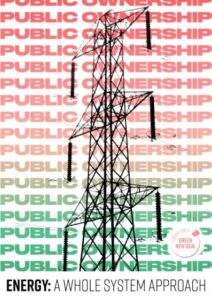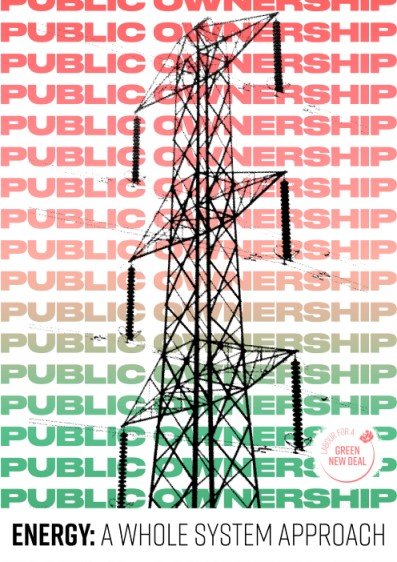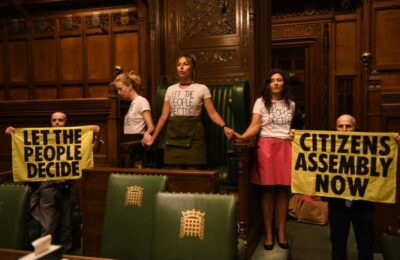By Red-Green Labour’s Sean Thompson

Labour for a Green New Deal has been campaigning since 2019 for the Labour Party to adopt transformative socialist environmental policies and its motions have been passed by successive annual party conferences. Now LGND has launched a new campaign; Public Power Now, whose core demand is for democratic public ownership of the whole energy system.
This is of course a demand that all ecosocialists should support; LGND points out that the fossil fuel industry is making record profits and that the energy distribution companies in Britain’s fragmented ‘free’ market currently have profit margins of 40.5% and 42.4% for the distribution of, respectively, gas and electricity. And it’s a popular demand; opinion polls consistently show that 66% of respondents agree that energy production and distribution should be in the public sector.
LGND also points out that instead of building on the Green New Deal policies of the 2019 manifesto, Labour have backtracked, with commitments mandated by conference and leadership election promises cast aside without any debate.
Since the 2019 conference, despite LGND’s motion for a 2030 net-zero target passing with near-unanimous support, and the party’s rulebook mandating the inclusion of motions with more than ⅔ support in Labour’s policy programme, the party leadership has simply ignored it. In 2020, after promising the most radical green recovery programme in the world, Labour’s machine disregarded the more than 70% of submissions to its National Policy Forum policy consultation that supported LGND’s People’s Green New Deal programme (and representatives on the environmental commission of the NPF didn’t even see the party’s green recovery report prior to its publication). And of course, Keir Starmer’s pledge, when standing for the Leadership of the party, that ‘Public services should be in public hands, not making profits for shareholders. Support common ownership of rail, mail, energy and water; end outsourcing in our NHS, local government and justice system’ has been quietly but comprehensively reneged on.
However, while LGND is right to criticise Starmer’s abandonment of (all) the pledges he made when he was campaigning for the Leadership and correct in pointing out the contempt the the Labour establishment has for both the opinions of the membership and the party’s own rules, it seems to be largely ignoring the policies that the Labour leadership has actually announced. In doing so LGND is missing the fact that they represent a potentially real, if very small, step forward.
Rachel Reeves claims that she will be Britain’s ‘first green chancellor’ and has announced, in by far the party’s biggest spending pledge to date, that the party will commit to spending £224bn on climate measures over the next eight years. Starmer has announced Labour’s Climate Investment Pledge which ‘will transform our economy and follow the example set by the Labour Government in Wales by investing £28 billion of capital into the green economy for each and every year over this decade. In language faintly reminiscent of some of that used by LGND itself in the past, Labour’s statement Stronger Together for a green and digital future announces that ‘Insulating homes is the best way to bring down energy bills, which is why the next Labour Government would commit £6 billion per year capital investment from our Climate Investment Pledge to a ten-year project to upgrade the energy efficiency of every home that needs it. Going street by street, our locally-delivered programmes will bring down bills for households, and do so in a way that creates well-paid jobs in every region of our country. ‘
Of course, recognising that Starmer and Reeves, responding both to the increasing pressure of the party’s membership and, to some degree at least, the scale and urgency of the climate crisis, have pledged to launch a programme of action that begins to go someway towards addressing it, doesn’t mean that we should adopt the breathless enthusiasm of the Guardian’s columnists and leader writers. For example, a recent opinion piece in the paper entitled ‘A Keir Starmer government might be more radical than you think’ waxes lyrical about Labours’ environmental pledges and while acknowledging that both Starmer and Reeves have gone out of their way to emphasise their commitment to ‘fiscal discipline‘ goes on to claim that ‘when the economy is doing badly, Labour has always moved to the left, seeking more active interventions and structural reform.’ Dream on.
There are serious flaws in Labour’s ‘green industrial revolution’ proposals as well as good cause to doubt its commitment and ability to implement them.
First, Labour is still committed to propping up the toxic white elephant that is the nuclear energy industry and will continue to throw vast amounts of desperately needed cash at it in order for it to continue to produce the most expensive electricity currently on offer.
Second, at Labour’s annual conference in September 2022, Starmer announced that that ‘a Labour government will create Great British Energy – a new, publicly-owned clean generation company that will harness the power of Britain’s sun, wind, and waves – to cut energy bills and deliver energy independence for our country.’ That sounds good – perhaps that means that he hasn’t entirely reneged on his pledge to take the energy industry into public ownership. Oh, hang on, he went on to say that ‘The role of GB Energy will be to provide additional capacity, alongside the rapidly expanding private sector, to establish the UK as a clean energy superpower and guarantee long term energy security.’ So, what he has proposed is in fact just another company to operate alongside other (much bigger) players in the rigged British energy market.
Starmer et al are claiming that this is modelled on the situation in France and Norway, where there are State owned companies within a ‘free’ market. However, the position in those countries is radically different from that which is being promised by the Labour leadership. In France, EDF (which is now wholly state owned) is the main electricity generation and distribution company, enjoying a virtual monopoly in electricity generation and dominating the distribution market. In Norway, Equinor is the state owned energy company that controls the oil and gas industry, the state owned Statkraft is by far the largest electricity producer and Statnett, owns about 98 % of the transmission grid. So in France and Norway, the public sector effectively controls the generation and distribution of energy. This is absolutely what is needed in Britain and absolutely not what the Labour leadership are proposing.
Third, Starmer and Reeves (a former Bank of England economist) are both in thrall to the economic orthodoxy of those terrible twins, the Treasury and the Bank of England. They have repeatedly stressed their commitment to ‘fiscal responsibility’ and to bringing down the national debt, and business leaders have been assiduously wooed and assured that under Starmer, Labour (or new New Labour?) will be a safe pair of macroeconomic hands. When (presumably) Labour wins the next general election in 2024 Starmer and Reeves will find that the Tories have left a time bomb in the Treasury for them. As a result of Truss and Kwarteng’s trashing of the economy in the shortest reign since Lady Jane Gray, Jeremy Hunt (sic) has introduced public spending cuts of at least £35bn, but in an attempt to stave of the worst of an apparently inevitable defeat has deferred most of them until after the next general election.
Starmer has already used the country’s dire economic state as an excuse for reneging on his commitments to public ownership and his insistence on fiscal discipline means that there is a real danger that Labour’s commitment to £28bn a year to fuel a green industrial revolution could be, regretfully no doubt, delayed, watered down and/or disappear behind a smoke screen of waffle and double counting. ‘We are going to have a rotten inheritance’ one shadow cabinet member told the Independent after Hunt’s autumn statement.The Labour leadership’s instinct will be to side-step the Tory trap and follow the example of Blair and Brown in 1997, when they went into the election with a pledge to stick to the Tories’ spending limits for their first two years.
In such circumstances, if the socialist and environment movements are able to hold Labour to its admittedly rather modest commitments it will constitute a small step forward. The demand for public ownership of the energy industry should, clearly, be one of our demands on the Labour leadership and LGND is absolutely right to raise it. But to restrict ourselves to that demand alone, particularly in the very detailed and over prescriptive way that LGND present it, and to ignore the possibility of wresting other positive developments from the death grip of the Treasury is making the perfect the enemy of the good, and (and I never thought I would hear myself say this) perhaps a wee bit ultra-leftist.




Agree that neither outright nationalisation nor Labour’s timid GB Energy figleaf offer plausible models.
However, selective public control is both practical and potentially ‘green’. A company like Shell could be reformed and the bottle neck to alternative energies that is National Grid should be taken over.
Starmer and Reeves could do this without contradicting their fiscal pledges.
See my article:
https://www.chartist.org.uk/creative-social-control/